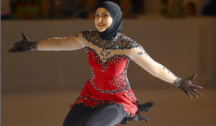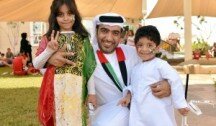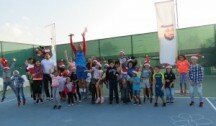As a child who found her friends between the pages of a book, Maitha Al-Khayat is encouraging kids to rediscover the art of telling stories
“When I put my veil on, it’s like I’m Batwoman; I feel like I have superpowers. It’s my creativity hat,” begins children’s author Maitha Al-Khayat, an abaya-clad superhero with a specific mission in mind.
“Kids don’t read any more or use their imagination. I want them to have fun with books like I did, to read them again and again.”
It’s not an untimely statement in a world that increasingly seems consumed with iPads and the latest do-it-all devices that seem to zap creativity.
While Maitha’s powers may be more subtle than super-strength or invisibility, the power of imagination is clearly what drives the Emirati-born mother-of-four to fight back against a generation of kids who no longer find joy in stories.
“Storytelling used to be the most basic exchange of information in the olden days,” she explains. “My theory is that the art of telling stories became forgotten once we started sending kids to school. The textbook has replaced all our stories and sanitises how we learn.”
“We never lost the tradition of telling stories in my family. I was always hooked on them right from the beginning,” Maitha says with a smile as though recalling a fond memory. “Every night before I went to sleep, my dad would tell me a bedtime story that he made up, never one from a book.”
A bookish child both by necessity and natural instinct, the young Maitha often found herself holed up in the school library. From a young age, she travelled with her father from place to place, rarely settling for long. She turned to books as solace when the language barrier made making friends difficult.
But through immersing herself in fairytales, Maitha’s grasp of the English language flourished. To Maitha, it proved one thing: that for inquisitive young minds, opening a book and reading for fun provided as much an opportunity for learning as studying from a textbook.
“When I was a kid, I used to hide with my books so my mum didn’t find out I was reading for pleasure instead of studying and take them away,” she laughs. “A world of fantasy and imagination isn’t considered serious enough learning content, and that’s the issue because it’s the best way to learn.”
At their core, this is what Maitha’s books set out to do. “I want to be the Arabic Dr Seuss,” she reflects. “I want kids to recapture that joy of reading and finding things out. If they don’t love it when they’re young, they won’t love it as adults.”
However, if Maitha’s first mission is to get kids to relish reading, then the second is to get little bookworms across the UAE, locals and expats alike, more connected to its cultural roots.
Maitha’s stories are not the typical happily-ever-after tales where the princess is rescued by the handsome prince. What makes Maitha’s stories special is that the heroine is more likely to be wearing a niqab than a ball gown, and the hero might have a long beard. Irrevocably intertwined with Emirati life and culture, Maitha’s tales weave a representation of culture in a fun and engaging way that counterbalance its sense of solemnity.
“Our children only read about their traditions through textbooks. My daughter came to me and said she wanted nothing to do with it, it was boring,” she says. “It made me sad that she wasn’t as proud of the culture of the UAE as she should be. I want to make kids want to learn about our heritage.”
As the author of several books on local life including I Love My Dad’s Long Beard and I Love My Mum’s Pretty Veil, Maitha’s stories may be an exploration of a not-often charted land and culture, but she’s keen to dispel any notions that there’s an agenda at work.
“People always ask me if I’m trying to promote my beliefs with my books focusing on Arabic culture,” she muses, “But that’s not the reason. I write them because I love who I am.”
“I wrote a story about a woman who just loves all different kinds of socks for every day of the week,” Maitha laughs, “but the difference is that she’s completely veiled.”
“Why does it need to be a statement about a woman wearing the veil?” she points out, “when it could just as easily be a statement about a woman who really loves socks?”
As the country’s rapid evolution from desert to skyscraper has begun to eclipse the meaning of its rich heritage, Maitha’s narratives are at their heart an attempt to stabilise Emirati tradition for a generation in danger of forgetting.
In a culture with such a rich tradition of storytelling, it seems ironic that while kids have even greater access to books and stories than ever, they lack the impulse to read and are losing that intrinsic part of their culture that Maitha is trying to preserve.
“This is the golden time to be Emirati and reflect on its traditions. There are so many wonderful things going on here, and I’m so glad to be a part of a place that pours its heart and soul into becoming a force to be reckoned with,” she says.
“The UAE is changing rapidly, but its traditions are being forgotten as the skyline changes. We need to bring Emirati culture into the present so we can preserve it.”











 NEWS: We have lift off
NEWS: We have lift off NEWS: Bright sparks to steal the show
NEWS: Bright sparks to steal the show NEWS: Student tests water on sustainability
NEWS: Student tests water on sustainability NEWS: Kids make a racquet at annual junior squash tournament
NEWS: Kids make a racquet at annual junior squash tournament NEWS: Feeling hungry? Get ready for a fiery food challenge like no other
NEWS: Feeling hungry? Get ready for a fiery food challenge like no other A night’s stay for two with breakfast
A night’s stay for two with breakfast AED 500 to spend at Dai Pai Dong
AED 500 to spend at Dai Pai Dong AED 250 to spend at Namshi.com
AED 250 to spend at Namshi.com AED 250 to spend at Recharge Lounge
AED 250 to spend at Recharge Lounge AED 500 to spend at Toni & Guy
AED 500 to spend at Toni & Guy ACTIVE: Ready to tri
ACTIVE: Ready to tri VIDEO: Training for TriYAS? Get some last minute advice and training tips from a pro
VIDEO: Training for TriYAS? Get some last minute advice and training tips from a pro ACTIVE: Abu Dhabi Week Tries... A new surf class that's firmly on dry land
ACTIVE: Abu Dhabi Week Tries... A new surf class that's firmly on dry land TRI UPDATE: Getting in the swim of things with top expert tips
TRI UPDATE: Getting in the swim of things with top expert tips FAMILY: An exciting world of discovery and adventure awaits little ones in the capital
FAMILY: An exciting world of discovery and adventure awaits little ones in the capital Creative family thinking about the bigger picture
Creative family thinking about the bigger picture Abu Dhabi Diary: Things to do this week
Abu Dhabi Diary: Things to do this week Good health is child's play
Good health is child's play Where to find that festive feeling in Abu Dhabi...
Where to find that festive feeling in Abu Dhabi... IN PERSON: Meet the former Queen roadie who now brings acts to the Abu Dhabi stage
IN PERSON: Meet the former Queen roadie who now brings acts to the Abu Dhabi stage PEOPLE: Meet Zahra Lari, the UAE's figure skating superstar
PEOPLE: Meet Zahra Lari, the UAE's figure skating superstar Telling tales
Telling tales New kid on the block
New kid on the block Flex appeal
Flex appeal National Day @ Odyssey Nursery
National Day @ Odyssey Nursery Holiday celebrations with Power Play tennis
Holiday celebrations with Power Play tennis Health facility opens in Al Shamkha
Health facility opens in Al Shamkha Over to You
Over to You Caravan: Journey of Art at The Space
Caravan: Journey of Art at The Space




















This is an excellent effort to preserve the rich local traditions and is the need of the hour.
Irrespective of the country, children should be made aware of their country of births traditions and culture.
subhanallah- allah has said that he has divided men into tribes so that they may know each other through their differences.
may allah give success and satisfaction to the author in this endeavour.